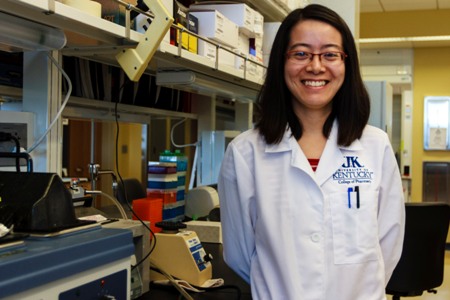Dec 7 2012
University of Kentucky researcher Yi Shu was awarded the Best Poster Presentation at the National Cancer Institute Alliance for Nanotechnology in Cancer's Annual Principal Investigators' Meeting last month.
 Yi Shu
Yi Shu
Entitled "Fabrication of Versatile RNA Nanoparticles Targeting to Cancer without Entering Normal Organs and Tissues," Shu's study showed promise for developing ultrastable RNA nanoparticles that may help treat cancer by regulating cell function and targeting to tumors without accumulating in normal organs and tissues.
The study focused on using re-engineered RNA fragments as the building block to fabricate versatile nanoparticles carrying therapeutic and diagnostic modules. The RNA nanoparticles have a well-defined structure and size. They are polyvalent in nature, which allows simultaneous delivery of multiple functional molecules for synergistic treatment.
In addition, they are thermodynamically and chemically stable, which keeps the RNA nanoparticles intact in circulation systems at very low concentrations and confers resistance to degradation.
Shu is a postdoc in the laboratory of Peixuan Guo, William S. Farish Endowed Chair in Nanobiotechnology in the UK College of Pharmacy and the UK Markey Cancer Center. In collaboration with Dr. Mark Evers, director of the UK Markey Cancer Center, Guo's team focuses much of their work on the use of ribonucleic acid (RNA) nanoparticles and a viral nano-motor to fight cancer, viral infections and genetic diseases.
The NCI's Alliance for Nanotechnology in Cancer program was launched in 2005 on the premise that nanotechnology-based materials and devices can strongly benefit cancer research and clinical oncology. Since then, the Alliance has leveraged the talent of a multidisciplinary community developing new solutions in early detection, in vivo imaging, and multifunctional therapeutics. Several newly developed technologies are entering clinical trials with the hope of benefit to patients.
Significant contributors to this work include research associate professor Dan Shu and research assistant professor Farzin Haque, both part of Guo’s research team, and Dr. Piotr Rychahou, a research assistant professor on Evers' team at Markey.